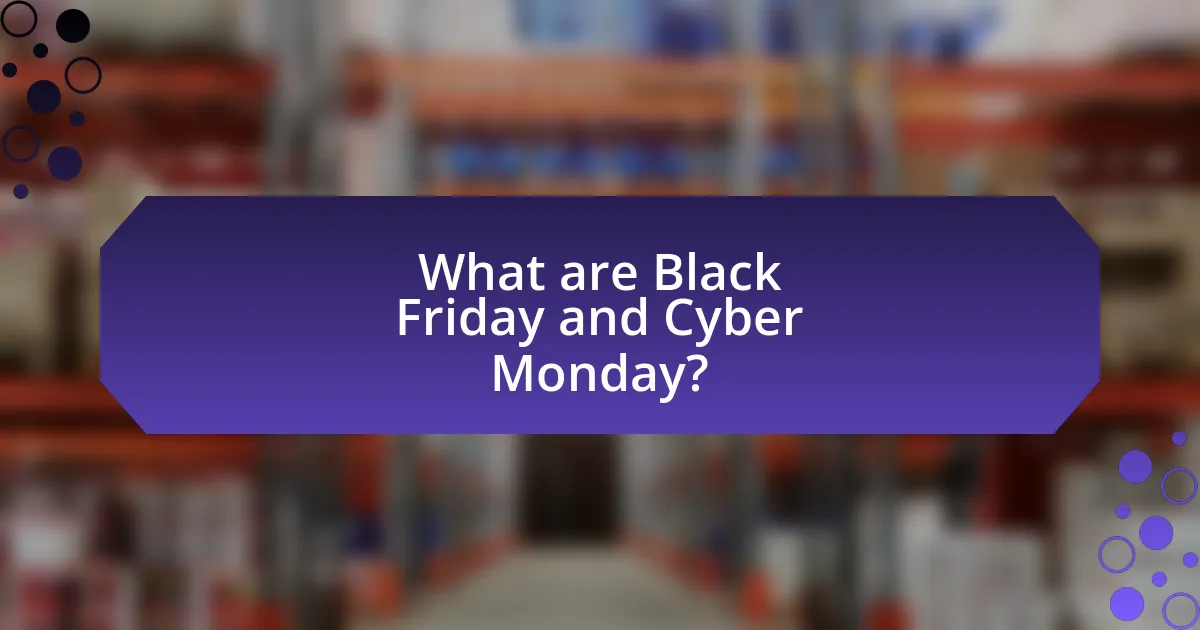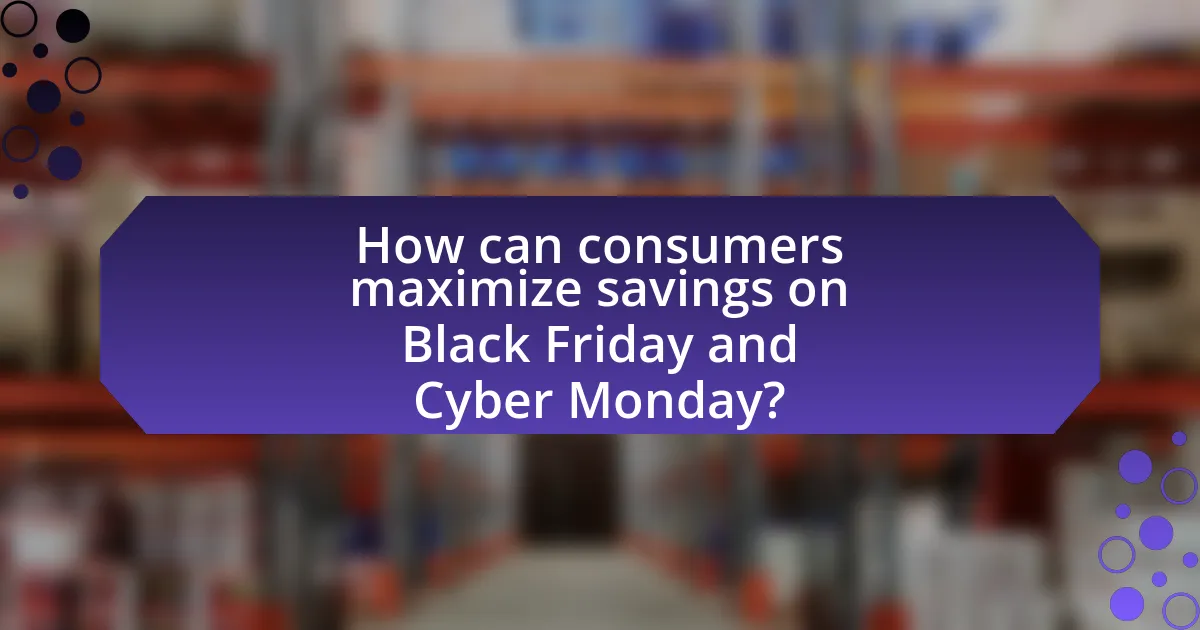The article focuses on the comparison between Black Friday and Cyber Monday, specifically examining which shopping event offers better coupon deals. It outlines the origins and evolution of both events, highlighting their significance in the retail calendar, with Black Friday traditionally emphasizing in-store shopping and Cyber Monday focusing on online sales. Key differences in shopping habits, product discounts, and coupon strategies for each day are discussed, along with tips for consumers to maximize savings. The article also provides insights into the types of coupons available and effective practices for utilizing them during these major shopping events.

What are Black Friday and Cyber Monday?
Black Friday is the day following Thanksgiving in the United States, traditionally marking the start of the holiday shopping season with significant discounts offered by retailers. Cyber Monday, occurring the Monday after Thanksgiving, focuses on online sales, providing consumers with exclusive deals on various products. Both events have evolved into major shopping phenomena, with Black Friday sales generating approximately $9 billion in 2021 and Cyber Monday reaching around $10.7 billion in the same year, highlighting their importance in the retail calendar.
How did Black Friday and Cyber Monday originate?
Black Friday originated in the United States in the 1960s as a term used by police to describe the heavy pedestrian and vehicle traffic that occurred the day after Thanksgiving. Retailers later adopted the term to signify the point at which they began to turn a profit, moving from being “in the red” to “in the black.” Cyber Monday emerged in 2005, coined by Ellen Davis of the National Retail Federation, to encourage online shopping on the Monday following Thanksgiving, as many consumers returned to work and continued their holiday shopping online. Both events have since evolved into major shopping days, with significant discounts and promotions offered by retailers.
What historical events led to the establishment of Black Friday?
The establishment of Black Friday is primarily linked to the retail industry’s shift towards post-Thanksgiving sales in the 1960s. Retailers in Philadelphia coined the term “Black Friday” to describe the heavy pedestrian and vehicle traffic that occurred the day after Thanksgiving, marking the unofficial start of the holiday shopping season. This day became significant as it allowed retailers to transition from operating at a loss (“in the red”) to profitability (“in the black”) due to increased sales. The term gained national popularity in the 1980s as retailers promoted it for its association with deep discounts and shopping frenzy, solidifying its place in American consumer culture.
What factors contributed to the rise of Cyber Monday?
The rise of Cyber Monday can be attributed to the increasing popularity of online shopping, advancements in technology, and strategic marketing efforts by retailers. The proliferation of high-speed internet access and the widespread use of smartphones have made online shopping more accessible and convenient for consumers. Additionally, retailers began to recognize the potential of the Monday following Thanksgiving as a significant online shopping day, leading to targeted promotions and discounts that incentivized consumers to shop online. According to the National Retail Federation, Cyber Monday sales reached $10.8 billion in 2020, highlighting the effectiveness of these marketing strategies and the growing consumer preference for online shopping.
What are the key differences between Black Friday and Cyber Monday?
Black Friday primarily focuses on in-store shopping, while Cyber Monday emphasizes online sales. Black Friday occurs the day after Thanksgiving in the United States, traditionally marking the start of the holiday shopping season, with retailers offering significant discounts on a wide range of products, often leading to large crowds in physical stores. In contrast, Cyber Monday takes place the following Monday, targeting online shoppers with exclusive deals and promotions, reflecting the growing trend of e-commerce. According to the National Retail Federation, in 2022, Black Friday sales reached approximately $9.12 billion, while Cyber Monday sales surpassed $11.3 billion, highlighting the increasing consumer preference for online shopping during this period.
How do shopping habits differ on Black Friday compared to Cyber Monday?
Shopping habits on Black Friday primarily involve in-store purchases, while Cyber Monday focuses on online shopping. On Black Friday, consumers often seek doorbuster deals and discounts on electronics and appliances, leading to crowded retail environments. In contrast, Cyber Monday shoppers prioritize convenience and often look for deals on a wider range of products, including clothing and home goods, with a significant increase in mobile shopping. According to the National Retail Federation, in 2022, 66% of consumers planned to shop in-store on Black Friday, while 77% intended to shop online on Cyber Monday, highlighting the distinct preferences for each shopping day.
What types of products are typically discounted on each day?
On Black Friday, electronics, home appliances, and toys are typically discounted, as retailers aim to attract shoppers with significant deals on high-demand items. In contrast, Cyber Monday primarily features discounts on online-exclusive products, including fashion, beauty items, and tech accessories, as e-commerce platforms focus on driving sales through digital channels. Historical data shows that Black Friday has consistently been a major shopping day for electronics, while Cyber Monday has emerged as the largest online shopping day, with sales reaching over $10 billion in 2020, according to Adobe Analytics.

Which Coupons Offer Better Deals on Black Friday and Cyber Monday?
Coupons that offer better deals on Black Friday typically include store-wide discounts, percentage-off promotions, and doorbuster deals. For instance, retailers like Walmart and Target often provide coupons that can lead to savings of 30% to 50% off on select items. In contrast, Cyber Monday coupons frequently focus on online-exclusive deals, free shipping offers, and additional discounts on electronics and tech products, with savings often reaching up to 60% or more. Historical data shows that Cyber Monday has consistently outperformed Black Friday in terms of online sales, with 2022 reporting over $11 billion in sales, indicating that the best deals may often be found online during this event.
What types of coupons are available for Black Friday?
Various types of coupons are available for Black Friday, including percentage-off coupons, dollar-off coupons, buy-one-get-one-free offers, and free shipping codes. Percentage-off coupons typically provide discounts ranging from 10% to 70% off regular prices, while dollar-off coupons offer specific monetary savings on purchases. Buy-one-get-one-free offers incentivize customers to purchase more items, and free shipping codes eliminate shipping fees, enhancing the overall savings experience. These coupon types are widely used by retailers to attract shoppers during the high-traffic Black Friday sales event.
How do store-specific coupons compare to general discount codes?
Store-specific coupons typically offer higher discounts and more tailored promotions compared to general discount codes. Store-specific coupons are designed to drive sales for particular retailers, often providing exclusive deals that can reach up to 50% off or more on select items, while general discount codes usually offer smaller, more uniform discounts, often around 10-20%. For instance, during Black Friday, retailers like Macy’s may provide store-specific coupons that apply to specific categories or brands, enhancing the perceived value for customers shopping at that store. In contrast, general discount codes can be used across multiple retailers but may lack the depth of savings found in store-specific offers.
What are the best strategies for finding Black Friday coupons?
The best strategies for finding Black Friday coupons include subscribing to retailer newsletters, using coupon aggregation websites, and following brands on social media. Retailer newsletters often provide exclusive discounts and early access to sales, while coupon aggregation websites compile various deals in one place, making it easier to find the best offers. Additionally, brands frequently share special promotions and coupon codes on their social media platforms, which can lead to significant savings. According to a 2022 survey by the National Retail Federation, 66% of consumers reported using coupons during Black Friday shopping, highlighting the effectiveness of these strategies.
What types of coupons are available for Cyber Monday?
Various types of coupons are available for Cyber Monday, including percentage-off coupons, dollar-off coupons, free shipping offers, and buy-one-get-one (BOGO) deals. Percentage-off coupons typically provide discounts ranging from 10% to 70% off regular prices, while dollar-off coupons offer fixed amounts off specific products or total purchases. Free shipping offers eliminate shipping costs, which is a significant incentive for online shoppers. BOGO deals encourage customers to purchase more by providing a free item with the purchase of another. These coupon types are widely used by retailers to attract consumers during the Cyber Monday sales event, which has seen significant growth, with online sales reaching over $10.8 billion in 2020, according to Adobe Analytics.
How do online-exclusive deals differ from in-store offers?
Online-exclusive deals typically offer lower prices and unique discounts compared to in-store offers. This difference arises because online retailers save on overhead costs associated with physical locations, allowing them to pass savings onto consumers. For instance, during Black Friday and Cyber Monday, online-exclusive deals can include additional percentage discounts or bundled offers that are not available in-store, as evidenced by data from the National Retail Federation, which reported that online sales during these events often exceed in-store sales by significant margins.
What are the best strategies for finding Cyber Monday coupons?
The best strategies for finding Cyber Monday coupons include subscribing to retailer newsletters, using coupon aggregator websites, and following brands on social media. Retailer newsletters often provide exclusive discounts and early access to promotions, while coupon aggregator websites compile various deals in one place, making it easier to find valid coupons. Additionally, brands frequently share special offers and flash sales on their social media platforms, which can lead to significant savings. According to a 2022 survey by RetailMeNot, 70% of consumers reported using online coupons during Cyber Monday, highlighting the effectiveness of these strategies.

How can consumers maximize savings on Black Friday and Cyber Monday?
Consumers can maximize savings on Black Friday and Cyber Monday by planning ahead and utilizing various strategies. First, they should create a budget and prioritize items they need or want, which helps in avoiding impulse purchases. Additionally, consumers can research and compare prices across multiple retailers to ensure they are getting the best deals. According to a 2022 report from Adobe Analytics, online sales on Black Friday reached $9.12 billion, indicating significant discounts available during this period. Furthermore, signing up for retailer newsletters and following them on social media can provide access to exclusive coupons and early promotions. Utilizing price tracking tools and apps can also alert consumers to price drops on desired items, enhancing their ability to save effectively.
What are the best practices for using coupons effectively?
To use coupons effectively, consumers should first research and compare available coupons before making a purchase. This practice ensures that shoppers identify the best deals, as studies indicate that consumers can save an average of 20% when using coupons strategically. Additionally, timing is crucial; using coupons during sales events like Black Friday or Cyber Monday can maximize savings, as retailers often offer deeper discounts during these periods. Furthermore, stacking coupons, where applicable, allows consumers to combine multiple discounts for greater savings. Lastly, understanding the terms and expiration dates of coupons prevents missed opportunities and ensures that consumers can take full advantage of the discounts available.
How can consumers combine coupons for greater discounts?
Consumers can combine coupons for greater discounts by stacking store coupons with manufacturer coupons and utilizing cashback offers. Many retailers allow the use of both types of coupons on a single purchase, which can significantly increase savings. For example, if a consumer has a store coupon for 20% off and a manufacturer coupon for $5 off, they can apply both to the same transaction, maximizing their discount. Additionally, using cashback apps alongside these coupons can provide further savings, as consumers can receive a percentage of their purchase back after applying the coupons. This strategy is effective during major sales events like Black Friday and Cyber Monday, where retailers often have promotional offers that can be combined with existing coupons for enhanced savings.
What are common pitfalls to avoid when using coupons?
Common pitfalls to avoid when using coupons include overlooking expiration dates, failing to read the fine print, and not checking for exclusions. Expiration dates can render a coupon useless, while fine print often contains crucial details about limitations or conditions that may affect the discount. Additionally, many coupons exclude certain items or brands, which can lead to disappointment at checkout if not verified beforehand. According to a survey by RetailMeNot, 70% of consumers have experienced issues with coupons due to these pitfalls, highlighting the importance of careful coupon management.
What tips can help shoppers decide between Black Friday and Cyber Monday?
Shoppers can decide between Black Friday and Cyber Monday by considering product availability, pricing trends, and shopping preferences. Black Friday typically offers better deals on in-store items, especially electronics and appliances, while Cyber Monday focuses on online discounts, often providing better prices on tech gadgets and apparel. Historical data shows that retailers like Amazon and Walmart frequently offer significant discounts on Cyber Monday, sometimes exceeding those on Black Friday. Additionally, shoppers should assess their comfort with in-store crowds versus online shopping convenience, as this can influence their decision.
How can consumers assess which day offers better deals for their needs?
Consumers can assess which day offers better deals by comparing historical pricing data and analyzing promotional trends specific to Black Friday and Cyber Monday. Research indicates that Black Friday typically features deeper discounts on electronics and appliances, while Cyber Monday often provides better deals on tech accessories and online-exclusive items. According to a 2022 report by Adobe Analytics, Black Friday saw an average discount of 27% on electronics, whereas Cyber Monday offered an average discount of 22% on similar products. By reviewing past sales data and current promotions, consumers can make informed decisions tailored to their shopping needs.
What resources are available to compare deals on both days?
To compare deals on both Black Friday and Cyber Monday, resources such as deal comparison websites, price tracking tools, and coupon aggregators are available. Websites like Honey and Rakuten provide users with the ability to track prices over time and find the best available coupons for both shopping days. Additionally, platforms like CamelCamelCamel allow consumers to monitor price history on Amazon, ensuring they can make informed purchasing decisions. These resources aggregate data and user-generated content, making it easier to identify which day offers better deals on specific products.



